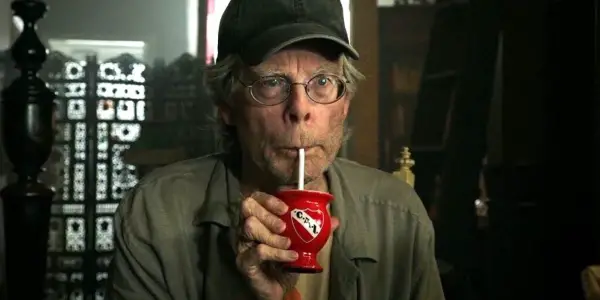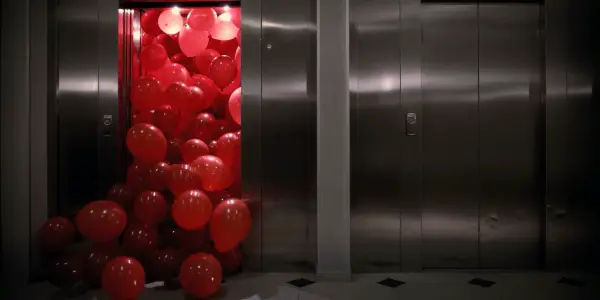Fantastic Fest 2022: KING ON SCREEN

Stephanie Archer is 39 year old film fanatic living in…
There is no name more recognized in both the literary and cinematic world than Stephen King. From horror to Oscar-nominated dramas, for decades King’s works have graced screens both big and small, finding their strength in timeless examinations of deeply rooted character studies, political and societal examinations, and pure terror. But what makes King‘s works so adaptable? What is it about the stories he has crafted for decades that not only enthrall both reader and filmmaker, but keep audiences coming back for more. Daphné Baiwir‘s King on Screen attempts to answer these questions, bringing a plethora of writers and filmmakers who have each had a hand in bringing King to the screen. And while the documentary does have a rocky start, it still manages to capture the spirit of King and the power his works have infused into cinema.
A Rocky Start
King on Screen opens with a car twisting and turning through a forest, mirroring the same scene in The Shining. As the opening continues, a woman with a painting in the back seat making her way to an undisclosed destination, it begins to feel more of a narrative than the documentary promised. As she makes her way into a shop named “In the Tall Grass”, the small opening segment becomes an inundation of King references. From Cujo to Christine to Creepshow, each reference is not only a fun scavenger hunt for the loyal fan but also crafts a nostalgic feel early on. Yet, King on Screen struggles in these opening moments, sadly feeling cheap, poorly acted and missing the mark. There is confusion too in its inclusion, many viewers potentially finding themselves wanting to recheck the synopsis for the film having possibly mistaken what they are in for.

Even as this opening introduction concludes, King on Screen struggles to find its footing. As the opening sequence transitions to the actual documentary, there is a high octane feeling to the rapid fire of talking heads and clips, the fast-paced editing unable to craft any initial direction and emotional connection. At one point, its fast-paced editing cuts a talking head off mid-sentence, heightening the disjointed feeling between the audience and film. This is further reinforced as when King on Screen finally does give its talking heads a moment to speak, it feels more of accolades praising King rather than a deep look at his adaptations. This star-struck feeling is further heightened as the directors tunnel vision their talk of King‘s success on screen, momentarily forgetting the effort of those who have effectively worked to adapt his various stories to screen.
Finding Direction
King on Screen does begin to find its legs and directionality as it dives deep into the adaptation of The Shawshank Redemption, director Frank Darabont is given a spotlight to share not only his love for King and the book he adapted but the need to adapt it, the connectivity to the book, its characters, and its overall story. It is in this moment the feeling of accolades falls, and the craftsmanship that brought King to life takes shape. King on Screen is at its best as it settles into a balanced and even pace, honing on some of King’s most notable adaptations. As it struggles in its opening sequence and early editing, King on Screen evolves from star-struck accolades to a documentary of the page to screen.

King on Screen further transitions to a deeper look at The Shining and The Green Mile through its continued focus on King’s ability to craft meaningful and deeply invested characters, while also acknowledging the closed space many of these characters find themselves in. As the documentary continues to balance what makes King‘s works so adaptable and relatable to an audience, the film begins to craft a yearning for viewers to return to old classics and recent releases. As talking heads discuss the Americana of King‘s works, captured within small-town America, a deep understanding of the terror enclosed within King‘s works, and subsequent adaptations rises. King on Screen crafts a deep understanding that through relatable characters, enclosed spaces, and small-town settings, page and screen can be more terrifying because it is not what you expect within the traditional idea of America.
Prophesizing Character
At its core, King on Screen captures the prolific spirit of King’s novels, many of the interviewees stressing King’s ability to craft a character. As one of the talking heads states, King does not create situations alone, rather crafting truly intriguing and connective characters and placing them within a situation. Yet, many of these situations have proved themselves to be societal commentary that has stood the test of time, even at times prophetic, the talking heads of King on Screen pointing to the similarities of Donald Trump and the pandemic to the King classic The Stand. In these moments, viewers may find themselves drawing comparisons to Margaret Atwood’s Handmaid’s Tale and the films showcased during this portion of King on Screen. Are they prophetic or are we as a society just not looking hard enough at what is going on around us?
A key moment of character that deserves applause for its inclusion, yet seemingly glossed over in the face of the film’s 104-minute runtime, was its examination of King‘s deeply crafted female heroines – even its female villains. One of the movies cited was Dolores Clairborne, the film’s director Taylor Hackford recalled how much he understood the character of Dolores and was able to work with Kathy Bates to bring her to life – to bring a true female character to life. And while it is a key moment in King on Screen, its brief inclusion has presented a potential platform of conversation – where are all the women?
This question is directed to the talking heads, writers, and directors of King adaptations – all male. And while this documentary is brought to life by filmmaker Daphné Baiwir, this moment in the film becomes a silently ponderous one- why are female filmmakers and writers not adapting King novels? As we watch the documentary cover Carrie up to 2020’s The Stand, it makes you wonder how closed off the King world is to the female filmmaker – and who is closing it off.
Conclusion
It all started with Brian de Palma‘s Carrie, and Stephen King became a household name. What followed was a legacy unmatched within the literary and cinematic world. And with the upcoming release of Mr. Harrigan’s Phone, it is far from over.
King on Screen premiered at the 2022 Fantastic Fest on September 24, 2022!
Watch King on Screen
Does content like this matter to you?
Become a Member and support film journalism. Unlock access to all of Film Inquiry`s great articles. Join a community of like-minded readers who are passionate about cinema - get access to our private members Network, give back to independent filmmakers, and more.













